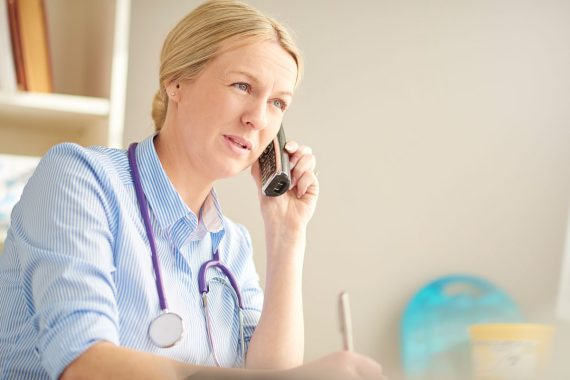NHS England reviewing ‘impact’ of GP remote consultations

NHS England is conducting a review of the ‘impact’ of GP remote consultations, a health minister has said.
It comes as the chief medical officer last week urged patients to visit their GP in a live briefing.
Responding to a written parliamentary question last month, primary care minister Jo Churchill said NHS England is also working with patients to monitor ‘digital access’.
Labour MP Dan Jarvis asked what recent assessment the Department of Health and Social Care (DHSC) has made of the effect of remote and telephone GP appointments on ‘patient wellbeing’.
Ms Churchill said: ‘NHS England and Improvement are currently carrying out an evaluation of online and video consultations in general practice to understand their impact.
‘They are also working collaboratively with patients and a number of research organisations who are conducting studies on digital access.’
The findings will be used to work with suppliers to ‘improve the design and accessibility of digital systems to better meet patient needs’, she added.
In response to another question by Mr Jarvis on the ‘potential merits’ of more face-to-face GP services returning, Ms Churchill said the review is an opportunity to ensure innovations can be adapted into a ‘sustainable model’ for the future.
She said: ‘This evaluation and other research work into the significant innovations in how GP practices offer care is an opportunity for the Government, NHS England and Improvement and professional representatives to ensure innovations can be adapted into a sustainable model into the future, to better meets patient needs and provide the best quality of care and ease of access for patients.’
Earlier this summer, health secretary Matt Hancock suggested all GP consultations could be done remotely in the future.
Meanwhile, the Scottish Government announced plans last month to make GP consultations via video the ‘default option’.
NHS England recently said a joint campaign with Public Health England will launch this month ‘to encourage the public to seek help when necessary’.
Related Articles
READERS' COMMENTS [7]
Please note, only GPs are permitted to add comments to articles










doesn’t babylon have all the outcome data or do they perhaps look after a different cohort of patients?
The problem is that the evaluation will almost certainly be done by digital zealots who will have pre-judged the outcome.
In London we are told everything is to be ‘digital by default’ – which seems to suggest implementation of digital solutions is to occur even if they are operationally poor or inefficient.
Prior to covid NHSD’s own figures showed that when asked the vast majority of patients wanted more F2F appointments; some wanted telephone consultations, but almost no one wanted digital/video (around 2% if I remember correctly).
My personal experience through covid suggests patients want F2F, are OK with telephone for some things, quite like to be able to send emails with pictures of lumps or rashes, but that there is almost no appetite for digital algorithms (which they consider ‘being fobbed off’) or video consultations (which they consider a gimmick).
My experience also suggests to me that F2F is a very safe and efficient way of delivering care; telephone is adequate in many cases but is less safe and also less efficient, emails pictures are sometimes helpful, but video contributes almost nothing extra to simple telephone care, and all forms of remote consulation are less efficient than F2F (taking longer and leading to more subsequent contacts) but more convenient for the patient.
Let’s see if the evaluation is brave enough to look at the evidence and go against the institutional position of ‘digital is always best even when it isn’t’.
The irony of course is that once a piece of software or IT is produced that works well and improves efficiency, we will all adopt it at great speed (like AccuRx): if NHSD want us to adopt digital solutions they just have to produce good ones.
After months of doing remote consultations is so clear that for patients who are unwell with symptoms F2F is by far safer, more efficient & generally superior and patients prefer it. Of course telephone / video has a place (mainly for more admin stuff like referrals/meds3/prescriptions) but core GP work has the remain F2F or we lose the soul of General Practice. Ratio probably should end up approx 70:30 F2F:remote
And yes agree with Darren, video on the whole ( there are exceptions ) is a time consuming gimmick
70% of consultations will indeed be remote or virtual – and they will commissioned from AQP including the Omnihealth Corp with its call centres in India; if you are a GP with a lease or a mortgage, you will struggle to pay the rent or mortgage when NHS England reduce your income by 70%
Surely they should be doing a randomised trial. Don’t see how it can be controlled though?
Yes I agree about video consultations. I think I’ve done precisely 3 since March. But I don’t agree that telephone consultations are “inefficient”. We deal with around 70% by phone, and so convert to f2f about 30% of contacts. The phone consults are shorter, and take place any convenient time. When we call people in, they are astounded that we can see them within an hour, because we are no longer the slaves of the appointment system – and neither are the patients. A massive stress has been lifted from us, and our patients are the beneficiaries.